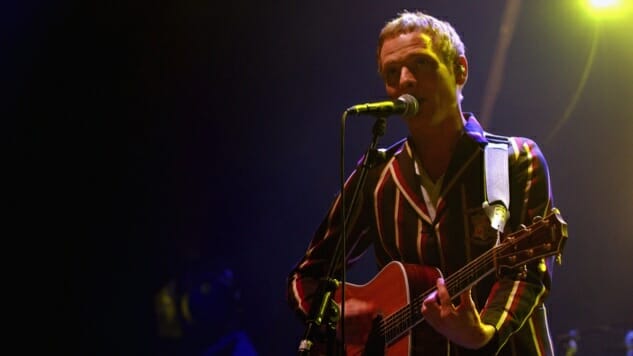Belle and Sebastian Saved My Life: How a Scottish Christian Singer Helped Me Find My Queer Identity

I celebrated this past Pride Month in a very personal way: by going to see Belle and Sebastian at Forest Hills Stadium in Queens. Perfume Genius and Frankie Cosmos opened and LGBTQ couples and rainbow gear abounded. It was fabulous. The extra queer vibe I detected might have been largely because of Perfume Genius, who is very openly gay, but, at the time, I chose to believe the whole bill made for the perfect big, gay storm. Either way, it seemed entirely appropriate to me as I reconnected and reckoned with the headliner, my official all-time favorite band. More than any other factor in my life, the long-running Scottish indie-pop ensemble has helped me accept and love myself for the queer weirdo that I am.
Today, I identify as bisexual or, more accurately, pansexual, but it’s taken a long time for me to accept that about myself. I’ve alway known I was attracted to women, but the bi-phobia (from both gay and straight people) and lack of representation that I encountered growing up in the 1990s made it hard to face the truth, which is that I can’t even imagine what it is like to only find one gender attractive, because my brain isn’t wired that way.
In high school, after briefly attempting to come out as bisexual in middle school, I identified as a lesbian. That seemed somehow safer and less lonely, plus my interest in men was negligible. “Lesbian” was at least a designation most people understood and which some people felt compelled to respect. Being bisexual, or pan- or polysexual, or queer has an ambiguity to it that makes all sorts of people uncomfortable. A friend who is a lesbian mysteriously disappeared from my life when I told her I might be interested in men, meanwhile a guy I was seeing broke things off when I told him I was attracted to women. Some straight female friends did the slow fade. To this day, coming out as bisexual invites awkwardness and innuendo from all sides.
With nowhere I could safely express this part of myself, it became submerged. As a consequence, I found almost everything around me just slightly alienating. I was depressed and withdrawn for a long time, but I didn’t realize what was happening or why. All I knew was that the first time I put on my college roommate’s Tigermilk CD and heard “She’s Losing It” was like waking up from a deep sleep. (This was the year 2000 or 2001, after the band released Fold Your Hands Child, You Walk Like a Peasant.) I identified immediately and intensely with Lisa, the song’s angry, disillusioned female protagonist, and her rule-breaking relationship with Chelsea. I’d never experienced anything like that before.
I loved music, but I hadn’t heard anything I related to the way I related to Belle and Sebastian’s strings-laced, ’60s-inspired pop songs, each one like a short story set to music. By the early 2000s, there were plenty of inspiring radical queer figures in indie music, but I didn’t feel radical. I felt sad and isolated, and idolizing Peaches wasn’t going to change that—though I did once meet a really cute girl at a Le Tigre concert. It was only in Belle and Sebastian lyrics (with honorable mention going to The Magnetic Fields) that I found a reflection of my own experience of sexuality and gender and a kind of absolution.
Sure, the majority of Belle and Sebastian’s material follows a sweetly heteronormative boy-meets-girl pattern, especially the more recent albums, but their songs about troubled queer youth were enough and exactly what I needed at the time: The bullied school boy “Lord Anthony,” the “mess in a dress” from “Photo Jenny,” the sexually fluid rebel of “Lazy Line Painter Jane” and, of course, the abused heroines in “She’s Losing It,” to name some favorites. The way their stories blended in easily with the other disaffected but scrappy kids in their songs just meant the music mirrored my own experience even more closely. In the songs’ ambiguity, particularly in songs like “Seeing Other People,” which is most definitely, though never quite explicitly, about an unacknowledged same-sex relationship, I found safety and familiarity.
-

-

-

-

-

-

-

-

-

-

-

-

-

-

-

-

-

-

-

-

-

-

-

-

-

-

-

-

-

-

-

-

-

-

-

-

-

-

-

-








































